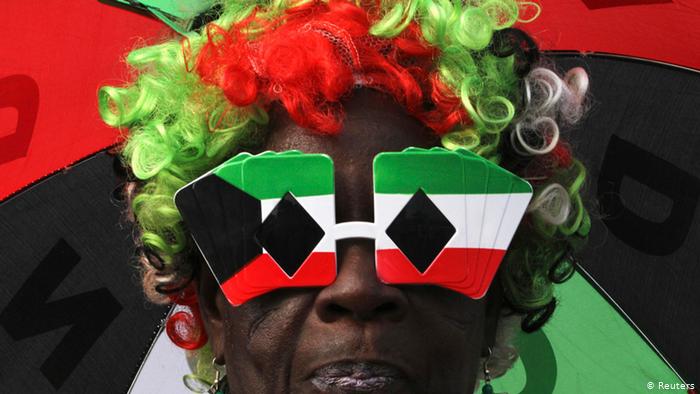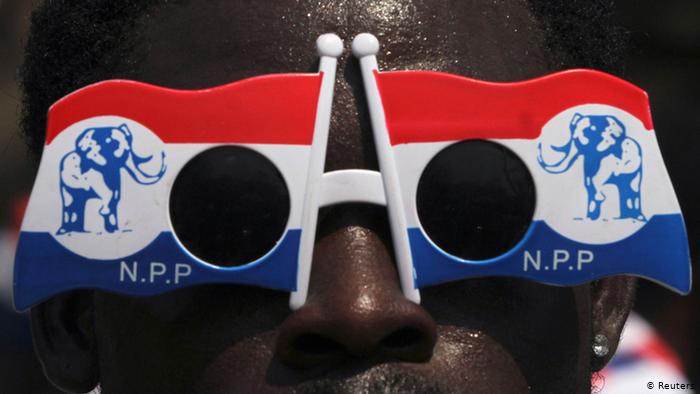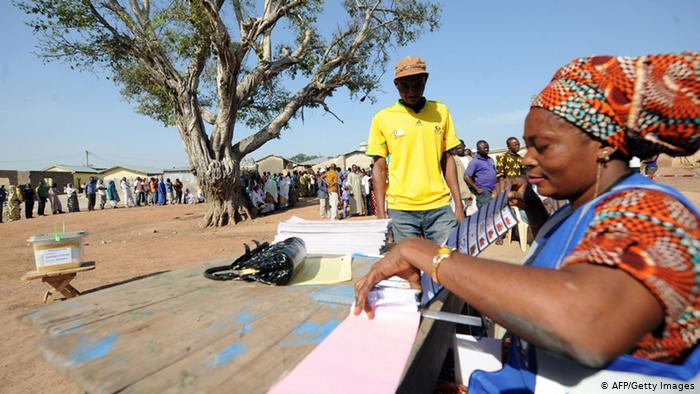Make no mistake, Ghana is doing well. It's one of only four sub-Saharan African countries ranked "free" in 2020 on the Freedom in the World index that measures political rights and civil liberties.
In addition, Ghana has a strong and independent broadcast media and consistently ranks in the top three countries in Africa for freedom of speech and press freedom.
As for the economy, the West African country shows an "impressive story of economic growth," to use the words of the World Bank. In the past three decades, real GDP growth has quadrupled and extreme poverty dropped by half. There is little doubt that the country of nearly 30 million people is on course to lift its citizens out of poverty.
Ghana plagued by corruption
It isn't all rosy, however. Pervasive corruption in the public sector is undermining Ghana's progress.
Thiscosts the country $3 billion (€2.47 billion) every year, according to the Ghana chapter of Transparency International. That is a third of what the country needs to stop perennial flooding.
Corruption has long been a topical issue in the country, with corruption stories consistently making headlines.
And ahead of Ghana's presidential election on December 7, much of the discussion is about which candidate is potentially less corrupt.
A dozen candidates are running for president but only two are serious contenders: Former president John Mahama (pictured top right) of the National Democratic Congress (NDC) and the incumbent, President Nana Akufo-Addo (pictured top left) of the New Patriotic Party (NPP).
Akufo-Addo and Mahama have both only served as president for a single term, although both have also been active in high-level politics for more than two decades.

John Mahama's administration hit by youth unemployment scandal
Let's start by looking at the corruption record of John Mahama, who was president from 2013 till January 2017.
In 2015, mid-way through Mahama's term, Ghana ranked seventh in Africa on Transparency International's Corruption Perceptions Index. That sounds good on the surface, but in fact Mahama's administration was hit by several corruption scandals.
In one of the biggest, an investigation by Ghanaian journalist Manasseh Azure Awuni in 2013 revealed that the government agency GYEEDA had spent nearly $500 million on a program that was supposed to provide employable skills to young people. But 80% of the funds ended up in the pockets of politicians, their cronies and crooked business people.
The seeds for this scandal might have been sown under the previous NPP government. But Mahama failed to terminate corrupt contracts or prosecute the officials involved.

Nana Akufo-Addo accused of corruption
President Akufo-Addo, who won the December 2016 election, campaigned vigorously on the promise of fighting corruption.
A year after assuming office, he created the Office of the Special Prosecutor to investigate corruption, including cases implicating public servants and politicians.
The head of that office, Martin Amidu — who resigned recently amid controversy — is a leading member of the opposition NDC.
But in November 2020, after more than two years in office and with very little to show for this period, Amidu accused Akufo-Addo of corruption.
Before the resignation of the special prosecutor, the auditor general Daniel Yaw Domelevo was placed on involuntary leave by the Akufo-Addo administration, effectively hounding Domelevo out of office.
Akufo-Addo's problems don't end there. Under his watch, press freedom is eroding. Investigative journalists looking into corruption have been attacked by Akufo-Addo's party folk. Reporter Ahmed Hussein-Suale Divela was even fatally shot in 2019, presumably because of his involvement in investigating corruption in Ghanaian soccer.
When it comes to who is more corrupt, the numbers say Mahama's worst score is Akufo-Addo's best.

Not much to chose between
But Ghanaians on the street will tell you there's little difference between the two presidential contenders when it comes to corruption.
They are indeed the same in many ways in terms of policies. Ideologically, Mahama's NDC is center left while the Akufo-Addo's NPP is center right. But over the years, the two ideologies have virtually merged.
More importantly, the officials of their respective governments seem the same in terms of demanding kickbacks when awarding government contracts.
The head of the Public Procurement Authority was suspended in 2019 for selling government contracts for profit. He has since lost his job but so far he has not been prosecuted.
Similarly, many of the officials involved in the 2013 youth employment scandal under Mahama are still free.
These cases have failed to convince Ghanaians that the two leaders are committed to tackling government corruption.
Since the West African country transitioned into multi-party democracy in 1992, the NDC and NPP have taken turns governing the country.
This year will be no different. One of them has to win these elections. This effectively leaves Ghanaians with a choice between a crocodile and an alligator.
Whoever wins needs to offer more than simple platitudes and rhetoric to reverse state capture.
-
The Author, Michael Oti is a reporter with DW.
Latest Stories
-
ECG Power Queens support Ho Female Prison
23 minutes -
Don’t appoint a new EC Chair; allow Jean Mensa to work – Prof. Stephen Adei to Mahama
48 minutes -
Bayer Leverkusen’s Jeremie Frimpong arrives in Ghana for visit
1 hour -
‘It will be disastrous if Mahama removes the Chief Justice’ – Prof. Stephen Adei
1 hour -
Jean Mensa must step down as EC Chair – APC and Movement for Change assert
2 hours -
Akufo-Addo calls on police to refine strategies to avoid prolonged electoral unrest
2 hours -
Only NPP looting brigade unhappy about ORAL – Ablakwa
2 hours -
CSIR-SARI introduces integrated soil fertility management technology to boost maize production
2 hours -
Ghana’s indigenous agribusiness faces challenges impacting economic growth – Dr. Azinu
2 hours -
41-year-old man arrested over illegal power connection
2 hours -
65-year-old man plans to walk over 250-km Kumasi-Accra journey for Mahama’s swearing-in
2 hours -
Woman dies after being set on fire on NYC subway
3 hours -
Elon Musk’s curious fixation with Britain
3 hours -
EBID wins the Africa Sustainability Award
5 hours -
Expansion Drive: Takoradi Technical University increases faculties
10 hours

